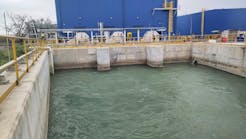By Patrick Crow, Washington Correspondent
The U.S. Environmental Protection Agency (EPA) has drafted standards to protect fish and other aquatic organisms that are inducted into cooling water systems at power plants and factories.
Nancy Stoner, acting assistant administrator for the Office of Water, said, "This proposal establishes a strong baseline level of protection and then allows additional safeguards for aquatic life to be developed through a rigorous site-specific analysis, an approach that ensures the most up-to-date technology available is being used. It puts implementation analysis in the hands of the permit writers, where requirements can be tailored to the particular facility."
The rule's impingement (when fish are pinned against screens or other parts of a cooling water intake structure) standards would apply to existing facilities where 25% of the water usage is for cooling and which have a design intake flow of more than 2 million gallons per day.
EPA said that more than half of the facilities that could be impacted by the impingement standard already use technologies that likely will have them in compliance.
In the case of entrainment (when fish are drawn into cooling water systems and are affected by heat, chemicals or physical stress), EPA plans to make site-specific determinations.
The proposed rule would require closed-cycle cooling (cooling towers) for any new units constructed at existing facilities. New plants already are required to use closed-cycle cooling.
EPA proposed the regulation as part of a legal settlement with Riverkeeper Inc. and the Natural Resources Defense Council. The agency will review public comments and take final action on the proposed rule by July 27, 2012.
Environmental groups had urged EPA to require all existing power and manufacturing plants to use closed-cycle cooling systems.
The Sierra Club said, "The new proposed guidelines … would give industry just what they asked for – weak standards to follow and a free pass to avoid the adoption of the latest water-saving and wildlife-protecting technologies."
Riverkeeper said, "A case-by-case approach will simply not work. Instead, it will continue an endless cycle of paperwork and litigation that will leave water bodies across the country unprotected and countless species at risk."
Hydraulic Fracturing
Hydraulic fracturing to enhance underground oil and gas production has resurfaced as a hot issue in the current Congress.
In some areas of the nation, hydraulic fracturing chemicals are believed to have contaminated groundwater supplies.
Legislation has been refiled in the House and Senate to end the exemption that fracturing chemicals have from the Safe Drinking Water Act (SDWA). The bills also would require companies to disclose what chemicals they intend to use in hydraulic fracturing operations. Sponsors are Reps. Diana DeGette (D-CO), Jared Polis (D-CO) and Maurice Hinchey (D-NY), and Senator Bob Casey (D-PA).
The combination of horizontal drilling and hydraulic fracturing has created a boom in the production of natural gas from previously uneconomic shale formations. The U.S. Energy Information Administration recently said that 1,000 of the 1,800 active drilling rigs were working on horizontal wells.
The Environmental Working Group said, "Energy is important to our economy, but so is clean water. With a new surge in drilling and reports of water contamination associated with oil and gas operations across the nation, it's more important than ever that companies comply with the SDWA."
At a recent Senate Environment and Natural Resources Committee hearing, Chairman Barbara Boxer (D-Calif.) observed that fracturing wastewater often contains toxic metals, highly corrosive salts, carcinogens such as benzene, and radioactive elements.
"A large amount of this wastewater is disposed in municipal sewage treatment plants that may not be equipped to remove the contaminants," she said.
Sen. James Inhofe (R-Okla.) said none of the major oil and gas producing states have had confirmed cases of groundwater contamination from fracturing fluids. He argued that any regulation should be left to the states, not the federal government.
Enforcement Actions
EPA has slapped two mining companies with large fines.
Consol Energy Inc., the largest U.S. producer of underground coal, has agreed to pay a $5.5 million penalty for Clean Water Act (CWA) violations at six West Virginia mines. It also will spend $200 million in pollution controls to reduce discharges of mining wastewater into Appalachian streams and rivers.
Consol will build an advanced water treatment plant using reverse osmosis technology near Mannington, W.Va. to remove high levels of chloride from mining wastewater. It will be the largest such water treatment facility in Appalachia, capable of treating 3,500 gallons per minute and substantially reducing chloride and other salts in waters discharged to streams.
EPA said the six Consol mines exceeded their CWA discharge permits hundreds of times over the last four years. They were the Blacksville No. 2, Loveridge, Robinson Run and Four States mines in the Monongahela River watershed and the Shoemaker and Windsor mines in the Ohio River watershed.
Separately, Monsanto Corp.'s P4 Production, a mining and phosphorus processing company, agreed to pay a $1.4 million penalty for CWA violations at its South Rasmussen Mine near Soda Springs in southeast Idaho. It also will spend $875,000 on monitoring and to prevent pollutants from entering local waters.
EPA said P4 discharged wastewater containing high concentrations of selenium and heavy metals from a waste rock dump at the mine without a required permit.
In other Washington news:
-- EPA has added 10 hazardous waste sites to the National Priorities List of Superfund sites and is proposing to include 15 more. It has listed 1,637 sites so far, 347 of which have been cleaned, resulting in 1,290 current sites. Sixty-six proposed sites are awaiting agency action.
-- In a pact with environmental groups, EPA has agreed to draft a new rule to curtail invasive species in the ballast water of ships. It will issue a proposed Vessel General Permit by November and a final permit by November 2012. The latter would take effect when the current permit expires in December 2013.
-- The U.S. Department of Agriculture said improved cropland practices in the Chesapeake Bay watershed have reduced edge-of-field sediment losses 55%, nitrogen in surface runoff 42%, nitrogen in subsurface flow 31% and phosphorus 40%.
-- EPA said a federal court has fined three officials of Ecological Systems Inc., an oil reclamation company that operated a waste treatment facility in Indianapolis, IN., for intentional wastewater and stormwater discharges. Joe Biggio was fined $15,000 while Mike Milem and Mark Snow were fined $3,000 each. All received three-year probations.
-- The agency said Montreal Maine & Atlantic Railway, based in Bangor, ME, will pay a $30,000 fine for an oil spill from its Milo, ME, shop that polluted the Piscataquis River in October 2009.
-- EPA said a $12 million cleanup has begun at Muskegon Lake, adjacent to downtown Muskegon, MI. Plans are to dredge and dispose of 41,000 cubic yards of sediment that contains elevated levels of mercury and polynuclear aromatic hydrocarbons.

